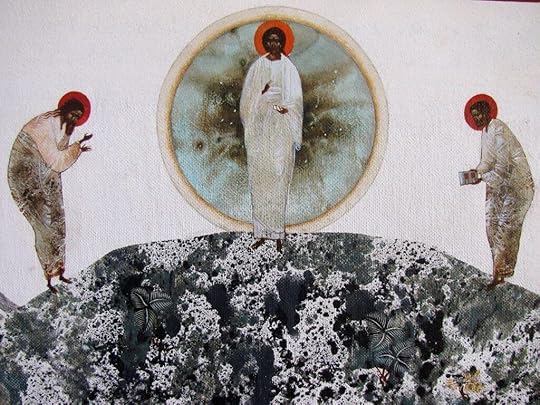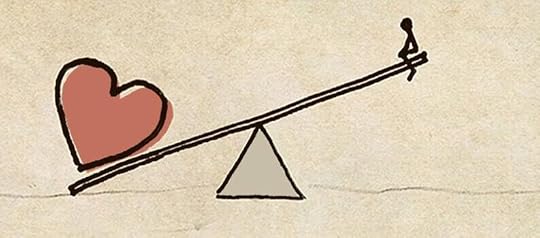The Descent into Moralism
Hey! After a decade of blogging, I’m moving to this space. Do me a solid and subscribe!
The pivot between epiphany and lent is always turns on the transfiguration where the disciples behold Jesus, alongside Moses and Elijah, aflame with the glory of God but, like the burning bush, not consumed by it.
If you’ve endured more than a handful of sermons, then chances are you already know how the preaching from this point on the mountaintop is supposed to go. Preachers point the finger at Peter and chalk this episode up as yet another example of Peter getting Jesus all wrong. It’s not about the mountaintop experience; it’s about rolling up our sleeves and serving serve the least, the lost, and the left behind.
The way down the mountain is almost always a descent into moralism.

About how faith is about going back down into the valley of life to do the things upper middle class Christians aren’t embarrassed to affirm in front of their pagan co-workers.
Go back down the mountaintop, back into “real life,” and do like Christ.
Except—
If Peter is wrong, if this is nothing more than another example of how obtuse Peter is, then when Peter professes “Master, it is good for us to be here. Let us make three tabernacles, one for you, one for Moses and one for Elijah” why doesn’t Jesus correct him?
Why doesn’t Jesus rebuff Peter and say: ‘No, it is good for us to go back down the mountain to serve the least, the lost, and the lonely?’If Peter’s suggestion that they rest there is such a grave temptation, then why doesn’t Jesus exhort him like he does just before this scene and say: ‘Get behind me, Satan?’
This is the only instance in any of the Gospels where Jesus doesn’t respond at all to something that someone has said to him.
What would Peter make of the fact that so many preachers make Peter the subject of the sermon? Peter would know that he should not be the subject of our sermons. Peter would know that the takeaway from the Transfiguration is not what we must go down and do for God. The takeaway from the transfiguration is what God is about to go down and do for us. For ALL of us. Once for ALL. The Transfiguration— it is a preview of the Gospel.
Luke spells it out for you.
Just before this scene, Jesus tells the disciples that the Son of Man must undergo great suffering, be rejected by the super-pious holiness enforcers, and get crucified by an angry crowd taking the only democratic vote in scripture (“We want Barabbas!”)
Next scene, today’s scene:
Moses and Elijah, the giver of the Law and the prophet of the Law, are there on this mountaintop “speaking with Jesus about his departure which he was about to accomplish in Jerusalem.”
Accomplish.
Luke doesn’t say Jesus was about to experience something unfortunate or unintended in Jerusalem. He says accomplish.
It’s vogue among preachers today to downplay the crucifixion, but when you read the Gospels straight through you discover that not only does Jesus talk about his death all the time, he speaks of it as a necessity. He speaks of it as a mission he will accomplish. Luke says here that Jesus speaks of his crucifixion as a departure that he was about to accomplish in Jerusalem. And the Greek word Luke uses for departure? Any guesses? Exodus. They’re talking about the exodus he will accomplish in Jerusalem. From the Pharaoh of Sin and Death.

In the David story, the glory of God is what spilled forth from the ark of the Law and struck an innocent bystanding boy named Uzzah dead. At the transfiguration, Elijah and Moses appeared to them on the mountaintop in glory, Luke tells us. The glory of God transfigured Christ, Luke tells us. And Peter and James and John beheld the glory, Luke tells us.
Notice what Luke doesn’t tell us— they lived.
They’re like Harry Potter. They’re the boys who lived.
Peter and James and John— sinners all, Peter maybe most of all— beheld the unmediated glory of God in the flesh and they did not receive the wage their sins had earned them. They were not struck dead. That’s why they walk away dead silent. They were dumbfounded by this preview of the grace of God where another’s death will do for undeserving sinners.
As much as we argue in the Church about what lifestyles are compatible with Christian teaching, it’s straightforward Christian teaching that we’re all incompatible with Christian teaching.
We have all sinned and fallen short. But Christ is the end of the Law. God judges not a one of us according to us. God judges every one of us on account of Christ’s cross and according to his righteousness. Such that, now, by grace alone— not by what you do or who you are— by grace alone— now, like those three disciples on the mountaintop today, you and I (though sinners we are and sinners we always will remain) We can sleep easy before the glory of God.
That the disciples live to go back down the mountain is a preview of the glad tidings that we are are justified not by our behavior, not by our belief, not by our good-deed-doing but by grace alone.
That’s the Gospel.
Everything else— every single other thing we can say—is the Law not the Gospel.
For freedom from the Law, Christ has set us free, scripture says. That’s the other takeaway from the transfiguration. Jesus appears there with Moses and Elijah, the giver of the Law and the prophet of the Law, because the Law— with all of its demands for holiness, all of its expectations of a lifestyle compatibile with its commands— the Law ends in Jesus Christ. Full stop. Moses and Elijah appear there in glory but their glory fades.
The true glory of God is the Christ who delivers grace.
Christianity is either all grace (what God has done for you) or it’s all works (what you must do for God). Grace and Works are mutually exclusive possibilities. This is the insight of the Protestant Reformation. If it’s not all of the former, it is all of the latter no matter the lip service you might pay to grace. Any attempt to balance or blend grace with works destroys the very notion of grace. It muddles the Gospel with the Law. It creates a kind of Glawspel, which is exactly the sort of toxic religion that’s killing the Church. Everything that is not the Gospel of grace is the Law.
As soon as you make Christianity about the Law, you become a debtor to every single one of its demands.
And thus far, only one guy has been able to clear that bar.
Whenever you make Christianity about the Law, about living a life compatible with the commandments, you become a debter to every single one of its demands.
This is why this is the only place in all of scripture that Jesus doesn’t reply.
Peter is right.
It is good for us to be here.
It is good for us to see that the Law, according to which not one of us measures up, ends in the glory of his grace; so that, the Law is fulfilled in us not through our pious deeds or holy living but through faith alone.
Faith alone in the Gospel of grace is what reckons to you the credit of a lifestyle compatible with Christian teaching.
That’s not just good news.
That’s the good news.
Because the Church is the only place in the world— at least, it should be— where we can lay down all our burdens of what we ought to do but don’t and what we oughtn’t do but did— the Church is the only place where we can lay those burdens down and rest in his grace.
Peter is right.
Until we learn to lay down the Law and go cold turkey from commandment-keeping and holiness-enforcing, until we learn to rest in Grace, every journey back down the mountain will be a descent that leaves the Gospel behind.
Jason Micheli's Blog
- Jason Micheli's profile
- 13 followers



